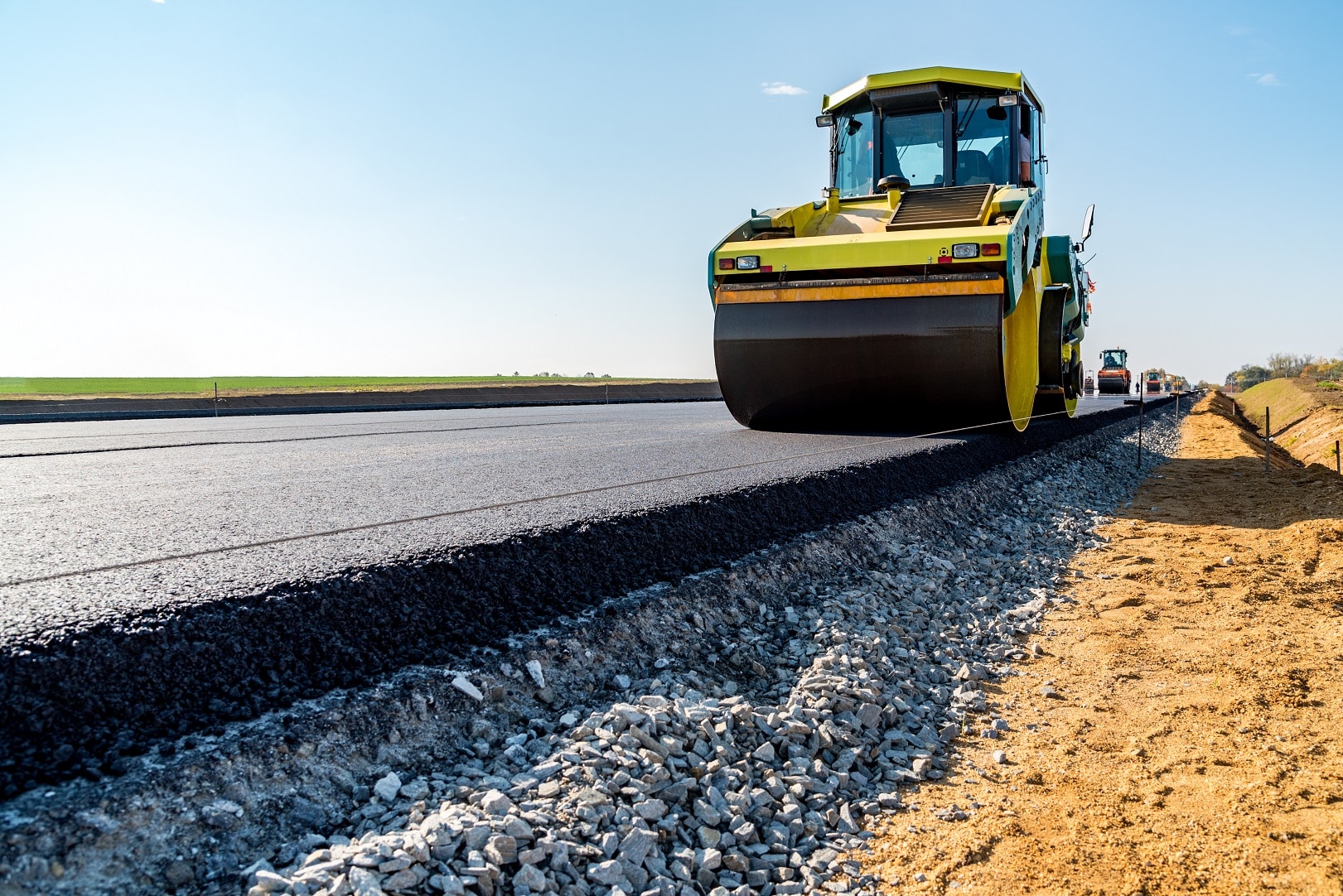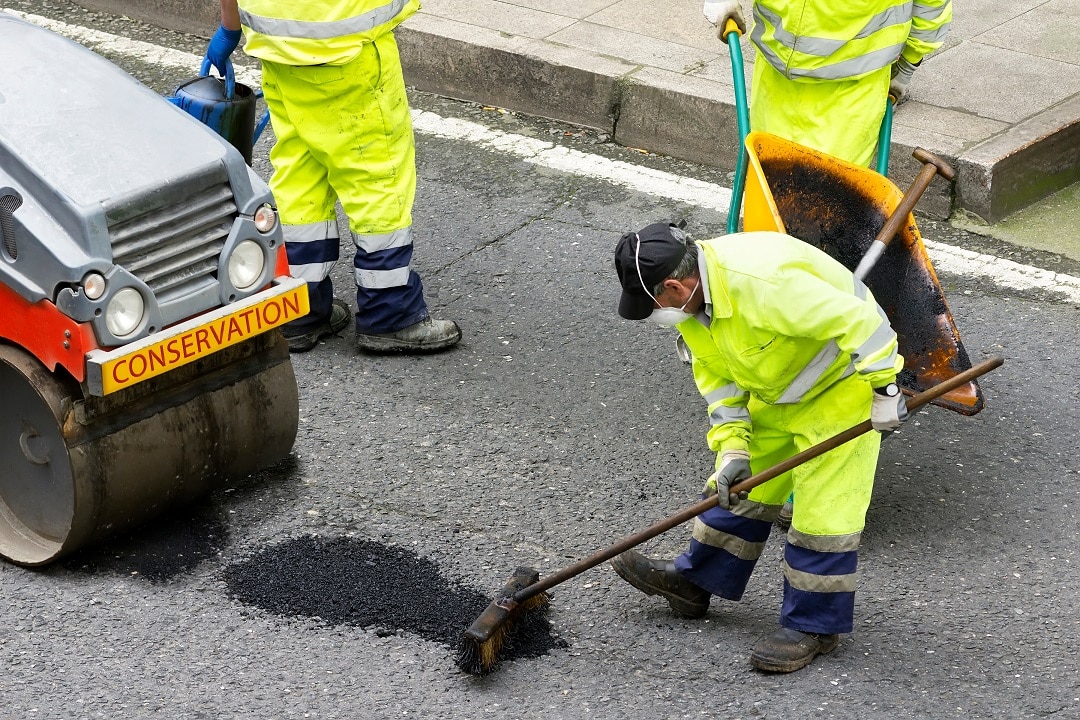Asphalt is an integral part of our lives, and most of us probably don’t really focus on it. Asphalt makes up the parking lots and roadways we use on a daily basis, but asphalt likely isn’t on our radar – until we hit a pothole, that is. Potholes and deterioration in asphalt can cause issues for vehicles and pedestrians, and they make driving far more challenging. So, what causes asphalt to deteriorate? In this blog we’ll cover what asphalt is and its purpose, the main reasons asphalt deteriorates, and the importance of asphalt maintenance.
What is Asphalt?
Asphalt is a material used to pave and cover roads. When heated it is sticky and workable, allowing it to cover roads with ease. Asphalt is made up of predominantly concrete (crushed stone, sand, and gravel), but the binding material of asphalt is bitumen (a thick, pourable substance that comes from petroleum). The addition of bitumen makes asphalt softer and easier on motor vehicles while still providing a safe and durable roadway surface. Asphalt has been used in Canadian road paving since 1915! So it’s clear the combination of concrete and bitumen is a good choice for roadways.
Why Do We Use Asphalt?
There are many reasons that asphalt is the best paving option. Asphalt is incredibly versatile, plus it’s composed of primarily recycled materials – 80% of asphalt that’s demolished can and typically is reused! Asphalt doesn’t leach toxins into its environment, making it a safe choice for road construction. Asphalt is a smooth surface which is important in northern climates when snow removal is required, plus asphalt can also be layered and modified to meet road condition needs. Asphalt in Northern Alberta needs to be a lot more cold resistant than the roads throughout California, so the layering and modifications to the components allow for more cold resistance and strength. Asphalt is also naturally darker in colour than other concrete mixes, so road markings stand out better and offer more safety and visibility.

Types of Asphalt Deterioration
Asphalt can deteriorate in many different ways. One of the most common complaints of asphalt deterioration is potholes. Potholes are large divots in the asphalt that are a sign the asphalt has completely failed. Another sign of asphalt deterioration are cracks, rutting, material disintegration, peeling, warping or distortion, and sinkholes.
Why Does Asphalt Deteriorate?
There are a few primary reasons that asphalt deteriorates.
1. Poorly Constructed Base Layer
In road construction, it’s important to have a load-bearing base layer. This foundational layer ensures the safety of the road, but it also protects the asphalt from deterioration. If the base layer wasn’t properly constructed, over time the base will warp, crack, and split, causing potholes and other issues with the top layer of asphalt.
2. The Asphalt Wasn’t Thick Enough
Asphalt has to be poured and paved thick enough to withstand the weight of traffic as well as the weather conditions. If the pavement was installed too thinly (or too quickly, not allowing proper installation) the asphalt is likely to become damaged in a short period of time.
3. The Soil Underneath Is Poor Quality
Certain areas are more fit for development than others. Sometimes, the soil and subgrade layer can be too soft, causing the roads to warp and the asphalt to begin deteriorating.
4. Freeze/Thaw Periods
Spring and Fall in Alberta are incredibly hard on roads and asphalt. If there’s any kind of cracks in the asphalt, the melting snow will get inside, and when it freezes overnight it expands, making the crack bigger. Alberta has very tough weather conditions for asphalt, so it’s important to perform regular maintenance.
5. Tree Roots
Tree roots can be powerful tools of destruction. When a tree is planted too close to a roadway or the roots are growing shallowly, the roots can grow into the surface layer of the asphalt and cause a cascading set of cracks.
6. Poor Maintenance Schedule
If an asphalt roadway isn’t maintained, it can lead to significantly faster deterioration. Asphalt cracks can be sealed before they’re spread, preventing damage from freezing and thawing and reducing the risk of potholes.
7. Time
Asphalt doesn’t last forever. Its makeup is durable while still providing a material that is safe for motor vehicles. Over time, water damage, sunlight, salt build up, chemical exposure, harsh weather conditions, and just general wear and tear from road use will cause asphalt to begin to deteriorate. That’s why cities need to have a budget to repave roads once they reach a certain age.

How Alexander Asphalt & Concrete LP Can Help
Here at ABC, we ensure that your concrete and paving services are done correctly. We offer ground stabilization, concrete pouring, asphalt paving and mining, earth works, underground services, and snow removal. When we pave a road, we ensure it’s done to the highest standard to withstand Alberta’s harsh winters. We follow strict environmental regulations and ensure our cultural values are brought into every project we complete. If you need asphalt paving services that are performed well, on time, and on budget, contact us!

